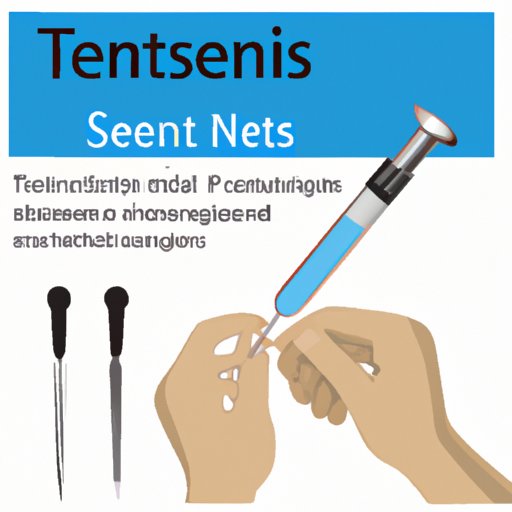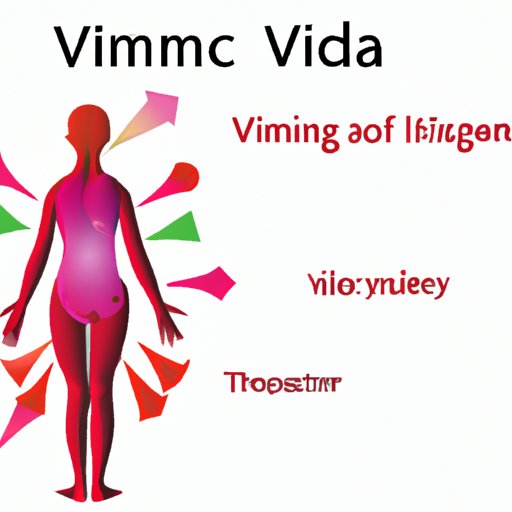
I. Introduction
Tetanus is a bacterial infection caused by the Clostridium tetani bacteria that can affect the nervous system and ultimately lead to severe complications if left untreated. While this disease is not very common, it is a life-threatening medical emergency that requires prompt attention. In this article, we’ll explore the symptoms of tetanus, its effects on the body, and how to prevent it.
II. Understanding Tetanus Symptoms
The Clostridium tetani bacteria that cause tetanus are typically found in soil, dust, and animal feces. The bacteria enter the body through a wound, such as a cut or puncture, and produce a toxin that affects the nervous system. Tetanus symptoms can include muscle stiffness, spasms, and lockjaw, and, in severe cases, can lead to suffocation and muscle damage. The complications of this disease make it important to understand and recognize its symptoms in order to seek treatment.
III. Recognizing the Signs of Tetanus Infection
One of the most effective ways to prevent tetanus is by getting a tetanus shot. These shots are typically given as a combination vaccine, such as the Tdap vaccine, which provides protection against tetanus, diphtheria, and pertussis. Despite vaccination efforts, however, individuals can still become infected with tetanus. Symptoms can develop within a few days of the wound, or may not appear for several weeks. Some common symptoms of tetanus include:
- Stiffness in the jaw and neck muscles
- Painful muscle contractions, or spasms, in the abdomen, back, or extremities
- Fever and sweating
- Rapid heartbeat and high blood pressure
- Irritability and exhaustion
If you are experiencing these symptoms, it’s important to seek medical attention right away to receive appropriate treatment and reduce your risk of complications.
IV. Identifying the Various Tetanus Symptoms
Localized tetanus is a milder form of the infection that affects only the area around the wound. Symptoms are typically limited to muscle stiffness and spasms at the site of the wound and may not require hospitalization. Generalized tetanus, on the other hand, is a more severe form of the infection that can spread throughout the body, causing muscle stiffness and spasms in many different areas. Generalized tetanus can lead to respiratory failure and require hospitalization and intensive care treatment. The effects of tetanus can differ depending on the severity and location of the infection.
V. Spotting Symptoms and Seeking Medical Help
If you have experienced a wound and are experiencing tetanus symptoms, it’s important to seek immediate medical help. A healthcare provider can assess your condition and administer a tetanus shot if necessary. They can also provide guidance on how to properly care for your wound to prevent infection. To care for a wound:
- Clean the wound thoroughly with soap and water
- Apply an antibiotic ointment and cover with a sterile bandage
- Watch for any signs of infection, such as redness, swelling or pus
If you have not received a tetanus shot in the past 10 years, you may need a booster shot to protect against tetanus.

VI. Unpacking the Symptoms and Their Effects on the Body
The tetanus toxin affects the nervous system, causing muscle stiffness and spasms. The bacteria release a neurotoxin called tetanospasmin, which prevents the neurotransmitter responsible for relaxing muscles from working. This leads to muscle stiffness, rigidity, and spasms. Over time, the muscles of the body can begin to break down, leading to potentially life-threatening complications such as respiratory failure.
VII. Keeping Yourself and Your Loved Ones Safe
Preventing tetanus infection is the best way to protect yourself against this dangerous disease. Tips for preventing tetanus include:
- Keep up-to-date on tetanus booster shots
- Care for wounds properly to reduce the risk of infection
- Avoid contact with soil, especially when gardening or performing yard work, to reduce exposure to the bacteria
It’s important to educate loved ones, especially children, about tetanus and the importance of wound care and vaccination.
VIII. Raising Awareness About Tetanus Symptoms and Prevention
You can help raise awareness about tetanus symptoms and prevention by sharing this article with friends and family. Encourage them to stay up-to-date on their tetanus shots and to seek medical treatment if they experience symptoms of tetanus.
IX. Conclusion
If left untreated, tetanus can have serious health implications. Recognizing the symptoms and taking preventative measures, such as getting tetanus shots and properly caring for wounds, can help reduce your risk of infection. By becoming informed about tetanus symptoms, you can help protect yourself and others from this dangerous disease.




